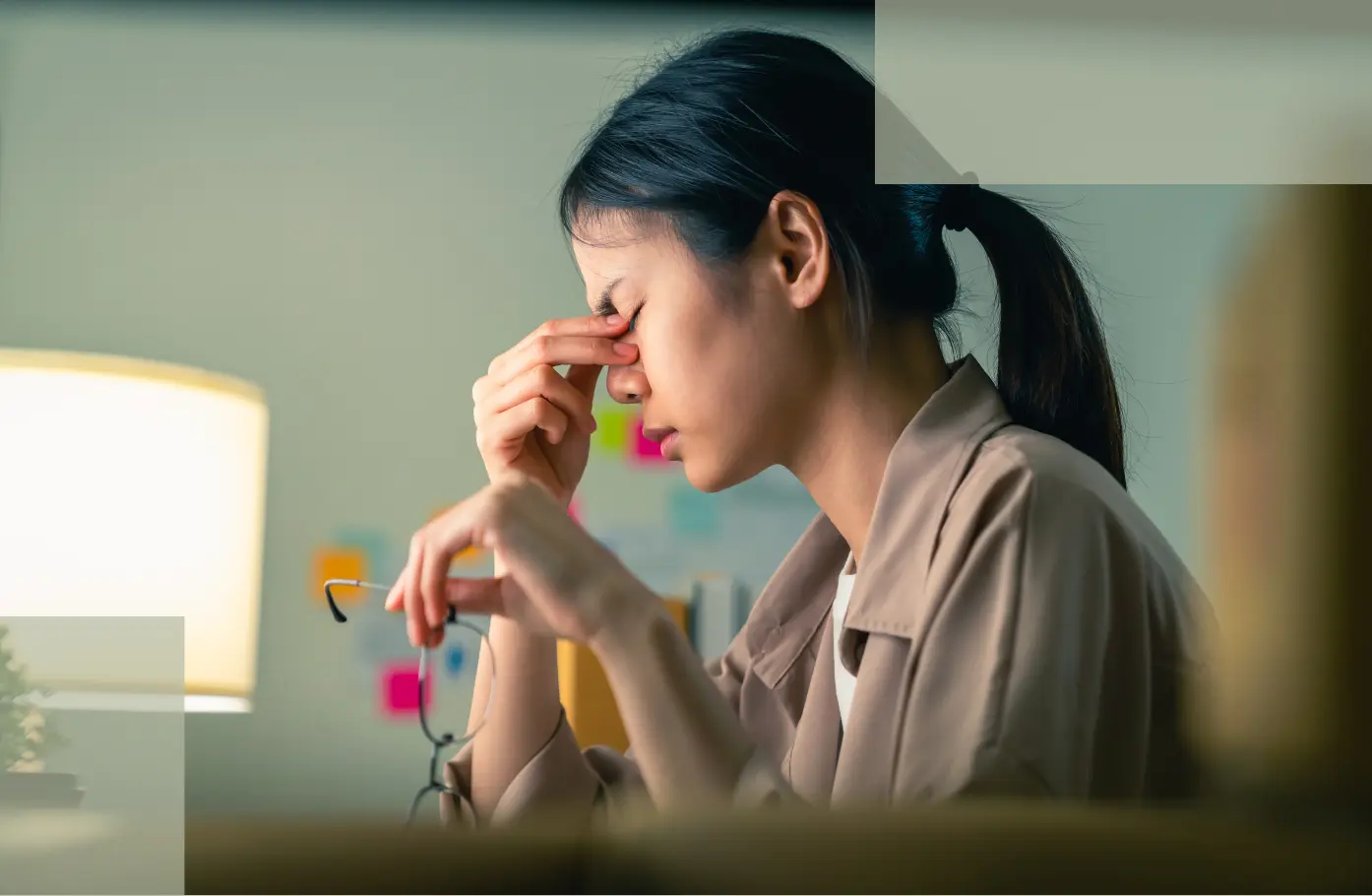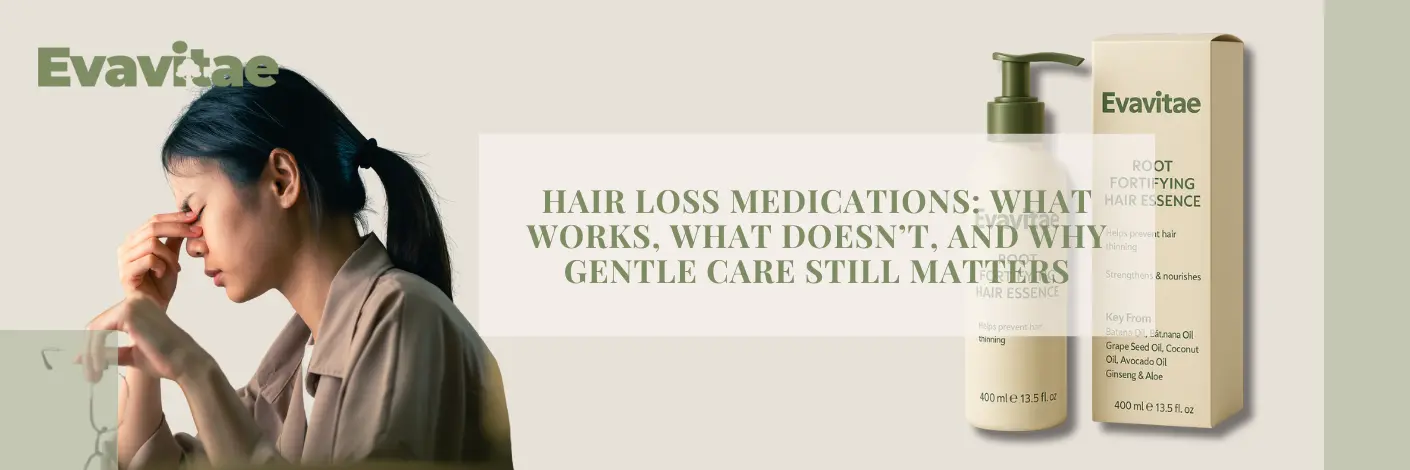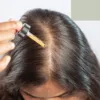
Hair loss can be a distressing experience, impacting not only physical appearance but also self-confidence and overall well-being. For many, the first instinct is to turn to medication. But with countless options on the market, it’s crucial to understand which medications are effective, how they work, and what role complementary care can play in supporting healthier hair.
This article provides a science-based look at hair loss medications, their limitations, and why a holistic approach—including gentle topical care—remains key to achieving long-term results.
Common Causes of Hair Loss
Before diving into medications, it’s essential to understand why hair loss occurs. The most frequent causes include:
- Androgenetic Alopecia (Male/Female Pattern Baldness): Genetic predisposition influenced by hormones, particularly dihydrotestosterone (DHT).
- Telogen Effluvium: A temporary shedding phase often triggered by stress, illness, or rapid weight loss.
- Hormonal Imbalances: Conditions like PCOS, menopause, and thyroid disorders can disrupt the hair growth cycle.
- Nutritional Deficiencies: Low iron, vitamin D, or protein intake can weaken follicles.
- Scalp Conditions: Inflammation, dandruff, or infections may compromise hair health.
Understanding the root cause matters because treatment strategies vary significantly based on the underlying condition.
Popular Medications for Hair Loss
Several medications have been clinically studied for treating hair loss. Here’s what you need to know:
1. Minoxidil (Topical)
- How It Works: Minoxidil improves blood flow to hair follicles, extending the growth (anagen) phase of the hair cycle.
- Effectiveness: FDA-approved for both men and women. Results typically appear after 3–6 months of consistent use.
- Limitations: Benefits reverse if discontinued. Some users experience scalp irritation or shedding during the initial phase.
2. Finasteride (Oral)
- How It Works: This prescription drug inhibits 5-alpha-reductase, an enzyme that converts testosterone to DHT—a hormone linked to follicle miniaturization.
- Effectiveness: Particularly effective in male pattern hair loss.
- Limitations: Not recommended for women of childbearing age due to potential birth defects. May cause side effects like decreased libido or mood changes.
3. Spironolactone (Oral)
- How It Works: A potassium-sparing diuretic that reduces androgen activity.
- Effectiveness: Frequently prescribed for women with PCOS-related hair loss.
- Limitations: Requires medical supervision and regular blood tests due to potential electrolyte imbalances.
Many medications target hormonal-related thinning, but understanding the underlying condition can help guide more balanced care. Learn more in our article about female pattern hair loss and holistic approaches to support scalp health.
4. Dutasteride
- How It Works: Similar to finasteride but inhibits both type I and II 5-alpha-reductase enzymes.
- Effectiveness: May provide stronger results, though off-label for hair loss in many regions.
- Limitations: Shares similar side effect profiles with finasteride.
5. Corticosteroids
- How They Work: Reduce inflammation in cases of autoimmune-related hair loss like alopecia areata.
- Effectiveness: Best for patchy hair loss, not pattern baldness.
- Limitations: Requires professional administration (injections) and is not a permanent fix.
Do Hair Loss Medications Guarantee Full Regrowth?
While medications can slow shedding and promote regrowth, they are not magic bullets. According to research published in the Journal of the American Academy of Dermatology (2022), outcomes vary widely based on factors like age, genetics, and adherence to treatment.
Moreover, medications often work best when combined with lifestyle changes and scalp care that creates an optimal environment for follicles.
For those navigating long-term solutions beyond medication, this guide on female pattern hair loss offers valuable perspective on underlying causes, confidence, and gentle care routines that complement medical options.
The Role of Gentle Topical Care
Even when using medications, supporting your scalp with safe, non-irritating products is critical. Why?
- Minimizing Irritation: Harsh shampoos and styling products can exacerbate sensitivity caused by treatments like minoxidil.
- Maintaining Scalp Health: Clean, balanced scalps allow medications to work more effectively.
- Reducing Breakage: Strengthening the hair shaft helps preserve what you already have.
Brands like Evavitae emphasize this principle by offering science-based, sensitive formulations that complement medical treatments without harsh chemicals.
Lifestyle Factors That Amplify Results
Alongside medication and gentle care, lifestyle choices play a huge role:
- Balanced Nutrition: Prioritize protein, iron, zinc, and vitamins D and B12.
- Stress Management: Chronic stress can worsen hair shedding; practices like mindfulness or yoga help regulate cortisol.
- Avoiding Overprocessing: Heat styling, bleaching, and tight hairstyles can sabotage regrowth efforts.
When to Consult a Professional
Persistent hair loss, sudden shedding, or scalp discomfort warrants a medical evaluation. Your doctor may recommend:
- Blood tests for iron, thyroid, and hormonal profiles.
- Scalp biopsy to identify autoimmune conditions.
- Customized treatment plans combining medication and supportive care.
✨ Continue learning about prevention, early signs, and gentle recovery steps in the Hair Loss 101 Hub.
For science-backed solutions to postpartum shedding, check out our Postpartum Hair Loss Treatment Page.
References (APA Format)
- Rossi, A., et al. (2022). Update on the Management of Androgenetic Alopecia. Journal of the American Academy of Dermatology, 87(2), 372-383.
- Sinclair, R. (2021). Female Pattern Hair Loss: Clinical Presentation and Management. International Journal of Dermatology, 60(10), 1175–1185.
- Mayo Clinic. (2023). Hair Loss: Causes and Treatments. Retrieved from https://www.mayoclinic.org
- Harvard Health Publishing. (2023). Hair Loss in Women. Retrieved from https://www.health.harvard.edu
Evavitae products are now available exclusively at www.evavitae.com.




Add comment
You must be logged in to post a comment.